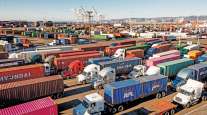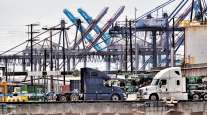Senior Reporter
West Coast Ports See Disruption as Labor Talks Drag On

[Stay on top of transportation news: Get TTNews in your inbox.]
Tensions between the Pacific Maritime Association and the International Longshore and Warehouse Union are heating up as periodic, unannounced work stoppages occur at several ports and other locations, causing cargo disruptions across the nation.
The actions have taken place the past several days at the Port of Oakland, the ports of Los Angeles and Long Beach and the Port of Seattle. They are taking place as the sides have been negotiating for almost a year attempting to finalize a multiyear contract for the 22,000 unionized workers who load and unload freight at West Coast ports and more than two dozen warehouse locations.
Management and the union acknowledged the work stoppages.
Please see the below statement issued this afternoon from the Pacific Maritime Association. pic.twitter.com/1aAQaT9wNM — Pacific Maritime Association (@WestCoastPorts) June 5, 2023
“The ILWU is staging concerted and disruptive work actions that have effectively shut down operations at some marine terminals at the ports of Los Angeles and Long Beach. The union is also staging similar work actions that have shut down or severely impacted terminal operations at the ports of Oakland, Tacoma, Seattle and Hueneme,” PMA said in a statement to Transport Topics.
Every year, cargo worth hundreds of billions of dollars moves through the West Coast freight gateways, first on ships then on trucks and trains to every corner of the country. Cargo from the Port of Los Angeles alone is delivered to each of the nation’s 435 congressional districts. Even the slightest disruption can have major spillover effects. Those ports collectively process products including agricultural goods, manufacturing components and consumer electronics.
The ILWU Local 13, which represents workers at Los Angeles and Long Beach, conceded some of its members were not showing up for their shifts.
“The rank-and-file members of the Southern California ILWU have taken it upon themselves to voice their displeasure with the ocean carriers’ and terminal operators’ position,” the union said in a statement. However, cargo operations in the ports continue as longshore workers remain on the job to move the nation’s cargo, as they have done valiantly for decades.”
ILWU Remains Committed to Negotiating a Good Agreement for ILWU Workers as Contract Talks Continue
Pandemic profits at the forefront
SAN FRANCISCO, CA (June 2, 2023) – The Pacific Maritime Association (PMA) represents over 70 multi-national ocean carriers and maritime companies… — ILWU Coast Longshore Division (@ilwulongshore) June 2, 2023
During the negotiations union and management said they would continue to bargain and there would not be a lockout by management or a strike by the workers.
The labor discord has many in the transportation, retail and agriculture sectors worried about the continued availability of their shipments.
All Port of Los Angeles container terminals are currently open and operating. For the latest cargo information, visit the Cargo Operations Dashboard on the Port's website: https://t.co/qptyfkQEQJ pic.twitter.com/Flq5WWs6bE — Port of Los Angeles (@PortofLA) June 6, 2023
The National Association of Chemical Distributors is the latest organization calling on the Biden administration to get involved in the negotiations.

Byer
“Businesses across the nation have navigated one challenge after another when it comes to the supply chain. Just as maritime trade was reaching some semblance of ‘business as usual,’ the unresolved labor contract negotiations between the PMA and ILWU have created severe disruptions and delays across several ports,” said Eric Byer, CEO of NACD. “As chemical distributors and our customers know, the repercussions of delays and backups at the largest ports in the nation, like the ports of Los Angeles, Long Beach, and Seattle, create additional strain and uncertainty that will be felt far beyond the actual shutdowns.”
Last month, other groups monitoring the negotiations, including American Trucking Associations and the National Retail Federation, urged the White House to take a more active role in the talks.
The administration’s role in the talks is also complicated by the fact there is a vacancy at the Labor Department after the departure of Secretary Marty Walsh, who was deeply involved in the national freight railroad talks. Deputy Labor Secretary Julie Su’s nomination has not been confirmed by the Senate and could be in jeopardy.

Bingham
Paul Bingham, director of global intelligence and analytics with S&P Global Market Intelligence, told TT the union is sending the message that it does not intend to accept a status quo contract with management, especially after its members worked continuously during the COVID-19 pandemic.
“It has gotten late in the negotiations, and circumstances have clearly changed with the PMA membership and the foreign steamline owners, and they are in a much different position now than they were when the contract expired a year ago,” Bingham said. “The ILWU is trying to come at the negotiations, understandably so, from the position that many of these terminal operators are flush with profits that they had back during the pandemic.
“But rates have fallen tremendously, and they don’t have the same amount of money, but the longshoremen are assuming they can negotiate greater wage increases than the steamship companies and terminal operators will agree to.”
Want more news? Listen to today's daily briefing below or go here for more info:




